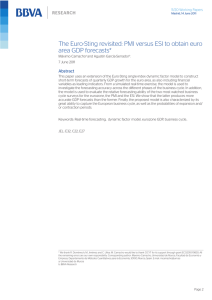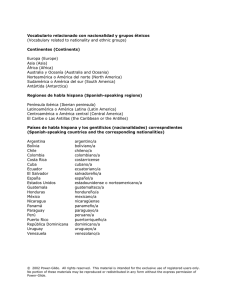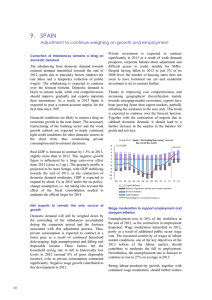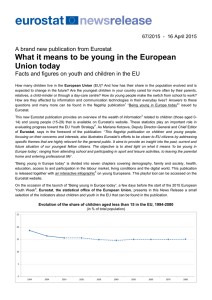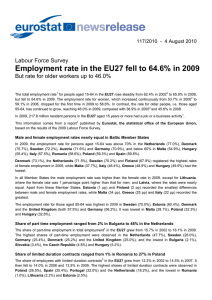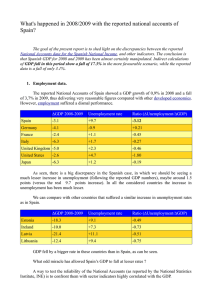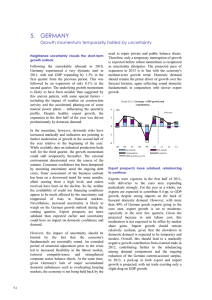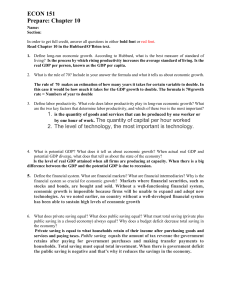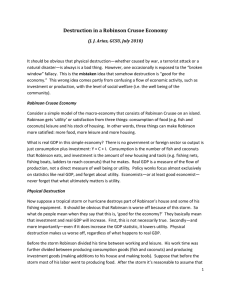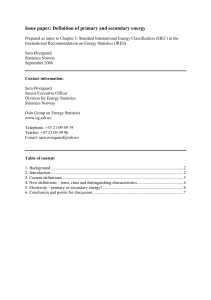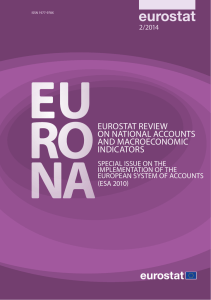We have to adapt our statistical production methods to the ways and
Anuncio
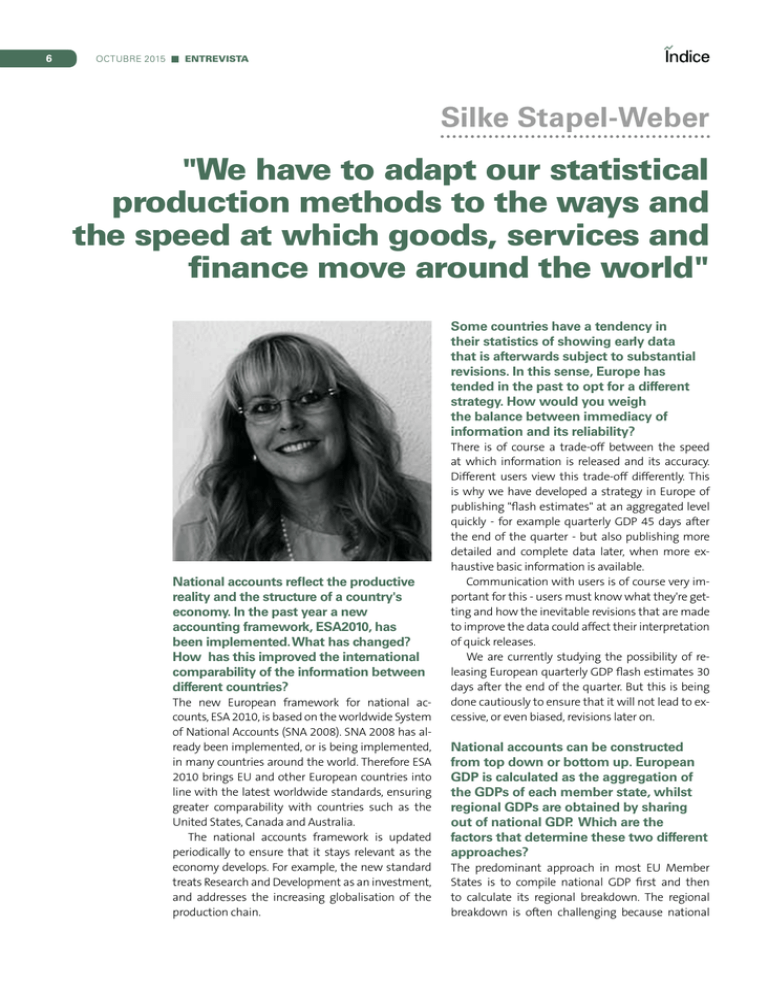
6 OCTUBRE 2015 ENTREVISTA Silke Stapel-Weber "We have to adapt our statistical production methods to the ways and the speed at which goods, services and finance move around the world" Some countries have a tendency in their statistics of showing early data that is afterwards subject to substantial revisions. In this sense, Europe has tended in the past to opt for a different strategy. How would you weigh the balance between immediacy of information and its reliability? National accounts reflect the productive reality and the structure of a country's economy. In the past year a new accounting framework, ESA2010, has been implemented. What has changed? How has this improved the international comparability of the information between different countries? The new European framework for national accounts, ESA 2010, is based on the worldwide System of National Accounts (SNA 2008). SNA 2008 has already been implemented, or is being implemented, in many countries around the world. Therefore ESA 2010 brings EU and other European countries into line with the latest worldwide standards, ensuring greater comparability with countries such as the United States, Canada and Australia. The national accounts framework is updated periodically to ensure that it stays relevant as the economy develops. For example, the new standard treats Research and Development as an investment, and addresses the increasing globalisation of the production chain. There is of course a trade-off between the speed at which information is released and its accuracy. Different users view this trade-off differently. This is why we have developed a strategy in Europe of publishing "flash estimates" at an aggregated level quickly - for example quarterly GDP 45 days after the end of the quarter - but also publishing more detailed and complete data later, when more exhaustive basic information is available. Communication with users is of course very important for this - users must know what they're getting and how the inevitable revisions that are made to improve the data could affect their interpretation of quick releases. We are currently studying the possibility of releasing European quarterly GDP flash estimates 30 days after the end of the quarter. But this is being done cautiously to ensure that it will not lead to excessive, or even biased, revisions later on. National accounts can be constructed from top down or bottom up. European GDP is calculated as the aggregation of the GDPs of each member state, whilst regional GDPs are obtained by sharing out of national GDP. Which are the factors that determine these two different approaches? The predominant approach in most EU Member States is to compile national GDP first and then to calculate its regional breakdown. The regional breakdown is often challenging because national entrevista accountants have to measure the activity in each region, i.e. not only where the company headquarters is based (often the capital city). Therefore it requires detailed source data and assumptions in some cases. At EU level, European GDP is calculated as the aggregation of GDPs of the Member States. However, more detailed aggregates - for example sector accounts which show data for households, governments, etc - are compiled at European level using a more complicated approach to ensure that the transactions are balanced. National accounts are calculated in nominal terms with the subsequent difficulty of disaggregating real growth from the growth in prices using deflators. What are the main challenges in measuring these deflators? The challenges faced are the same when compiling a price index. You want to take out only price effects and leave changes in quality of products as part of real growth. But quality can be a subjective issue and becomes particularly difficult when dealing with services, for example government services such as education and health where there are often no observable prices. This difficulty is compounded when you are looking a dynamic market with continuous innovation and new products, and where pricing strategy is complex, for example for mobile phones. Part of the contribution of countries to supranational organizations is dependent on their national income. In this sense, the underground economy could have an impact. How do national accounts cope with this issue and what has changed under ESA 2010? The national accounts have always had to cope with this issue - this is not new under ESA 2010. It is not an easy task, however national accounts do have one important feature to help they are an integrated accounting system using hundreds of different data sources. It is often the case that an activity missed in one source is picked up in another, and is therefore discovered when the accounts are balanced. Let me give you one example. Household surveys pick up expenditure on cigarettes and respondents, even if maybe underreporting a bit, do usually not separate cigarettes bought in shops from those bought from smugglers at the corner of the street. Industry and foreign trade statistics, however, would miss those cigarettes imported illegally to the country and sold on the black market. By comparing both numbers, expenditure on cigarettes and the sum of production and imports, statisticians get an idea about the amount of smuggled cigarettes. National accountants also use other information - on the labour supply or main material inputs for production to enhance their estimates. It is also important to explain, because some users have misunderstood this, that ESA 2010 did not introduce the measurement of "illegal activities" into the national accounts. These were also part of the previous ESA. However there has been a concerted attempt by all EU Member States to include illegal activities in their data at the same time as the conversion to ESA 2010. In most cases the impacts were not very large, but they certainly generated some press coverage! OCTUBRE 2015 What are the biggest challenges facing national accounts at the moment? In my view, there are three. Firstly the increasing globalisation of production makes it harder and harder to say what is happening in a single economy. We are all connected by very complex flows of products, intellectual property and finance, and collecting reliable data is very challenging. We clearly have to re-think what “national” means in National Accounts. And we have to adapt our statistical production methods to the ways and the speed at which goods, services and finance move around the world. Secondly we have seen a rapid evolution of new products as the internet has matured, and in many cases there has been a blurring of the traditional boundary between goods and services. There are many more cases of "free" services which are fed by developments in exchange of information and advertising. We have to find ways of capturing what is behind this and appropriately reflect it in the system of accounts. Lastly there is the issue of resources for national accounts. In the past few years there have been less resources made available to statistical offices at national and international level, and this has inevitably had an impact on the ability of statistical offices to maintain their current products, improve quality and also to address the challenges of the future, for exam- In the past few years there have been less resources made available to statistical offices and this has inevitably had an impact on the ability of statistical offices to maintain their current products, improve quality and also to address the challenges of the future 7 8 OCTUBRE 2015 ENTREVISTA ple using effectively the increasing amounts of digital information ("Big Data"). We need to get in a closer dialogue with our users to promote that quality statistics do not come for free. Some people say that GDP is an old-fashioned measure of the wealth of a country. What's your point of view? GDP is surely not a good measure of the "wealth" of a country. It does measure well a narrowly defined concept of economic production and consumption and it that respect deserves its continuing place at the centre of macroeconomic datasets. However we have all acknowledged that it needs to be supplemented by other measures which address, for example, impacts on the environment or the distribution of income and wealth amongst households. These measures have been developed in recent years and are starting to appear in mainstream statistics alongside GDP. What is Eurostat's role in national accounts – what value added does it bring? Eurostat has a central role to ensure that all Member States follow common national accounts standards and thereby publish comparable data. Where there are doubts, Eurostat takes the coordinating role in collabo- ration with Member States, to ensure that improvements are made and the data is fit for the various analytical, monitoring and administrative purposes. We are also taking the lead in regular review and further development of standards, again in close cooperation with the Member States and other international partners. Eurostat also produces and publishes European aggregates, and is increasingly involved in cross-country projects, for example in the compilation of European-level input-output tables. Last but not least we provide technical assistance to EU candidate countries, often with support from Member States experts, to help to fully develop their national accounts systems in line with European requirements. What knowledge and skills should national accountants have? Are there sufficient training opportunities for such experts in the EU? National accounts is a very particular discipline. It requires a range of skills and one could say that the ideal national accountant is one third economist, one third accountant and one third statistician. The main problem is that most universities do not teach these skills together and very few offer course in national accounts. So statistical offices at national and internatio- nal level find that they have to make great efforts to train incoming staff, and it can be two or more years before these staff reach the necessary level of knowledge, and even more before they develop an overview of the whole system. There is clearly a need to closer cooperate with universities to encourage academic courses on National Accounts and to promote exchanges of staff between statistical offices at national and international level. We usually finish off our interviews by asking for an endeavour of imagination. How do you see the European society in 20 years’ time? Could you give us an example of a fear, a priority and a wish regarding the European Union? I guess that you mean more generally, not in national accounts! My fear is the implications of what I see around me today - for example, the immense challenges that are faced in the society and the economy and in dealing with the unprecedented movement of people across Europe. The priority for all European leaders is to show the same solidarity of spirit that their predecessors showed when faced with equivalent challenges. My wish is that we find it possible to do so and become truly European. Dr. Silke Stapel-Weber Director at Eurostat – National Accounts, prices, key indicators Dr. Silke Stapel-Weber’s main responsibilities as director at Eurostat since 2014 include the quarterly and annual national accounts, prices and purchasing power parities, balance of payments, use and supply and input-output tables and related key indicators. The responsibilities cover methodology development, regular data production at EU and Euro area level, administrative use of certain data, compliance and quality management as well as respective data dissemination and international cooperation with member states, the ECB, OECD, IMF and the Worldbank. Stapel-Weber has over 25 years of experience in official macroeconomic statistics, academia and teaching. Over this period she held various technical and management positions at the University of Berlin, in the Central Statistical Office of the former GDR, in the German Federal Statistical Office, at Eurostat and in the Publications Office of the EU. She represents Eurostat in various professional bodies, including the interagency group and in the G20 context. Stapel-Weber (1962) studied macroeconomics and statistics in Berlin and Novosibirsk. She received her PhD for a study on the long-term effects of neglected maintenance and investment on the capital base and productivity of an economy, using hedonic methods. She is an elected member of the ISI and was nominated co-chair of the ICP Technical Advisory Group at the Worldbank (2002-2007).
